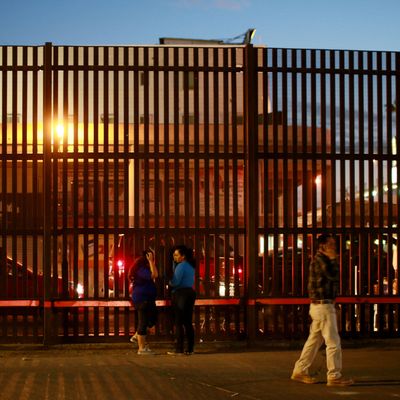
Raising the debt limit and enacting appropriations are different from the other big funding decisions we’ve been talking about recently. Unlike tax reform and health care, there is no filibuster-proof path to getting these things done. So if the Republicans who control the federal government want to avoid shutting it down or risking its credit at the end of September, they’ll need some Democratic votes.
There’s one big problem getting those votes: the strong possibility that the president will make a nonnegotiable demand for money for his pet border-wall project in exchange for must-pass legislation.
As slapstick as that may sound, Jonathan Swan of Axios assesses the risk of a train wreck over the border wall as quite high:
The wall is no metaphor to Trump. He will accept no substitutes to a huge, long, physical wall, which he believes his voters viscerally want. He told GOP Hill leaders in June he wants it to be 40 to 50 feet high and covered with solar panels. Hill Republicans privately mocked that idea, but some of those same people now recognize that Trump’s big, beautiful — and in heir minds, ridiculous — wall could be the thing that brings the U.S. government to its knees.
If Republicans are privately mocking the wall, Democrats are publicly defying Trump’s demands for one. So slipping an omnibus spending bill —or perhaps even a bigger package that includes a debt-limit increase — past his desk without wall money might not work:
Hill leaders have discussed ways to get Trump “enough” on border security so he feels they’re making enough progress to sign their funding bills. This could mean modest funding for the wall or other border security measures that moderates could live with, and/or other avenues to add funding to fight international crime gangs like MS-13.
But sources close to Trump say he’s dead serious about building an impressive wall and will go crazy when he realizes Congress has no plans to pay for it.
It is unclear what would constitute “going crazy” for Donald Trump, but most people in Congress would probably prefer, all things being equal, to avoid it.
Another entirely possible Trump reaction to a spending or debt-limit compromise that shirks the wall or other White House priorities is to renew his demands for the abolition of the legislative filibuster. A lot of observers laughed at him for blaming a 60-vote Senate threshold for the failure of Republicans to get to 50 votes on health-care legislation. But he might be right that he could get 50 votes for money for his wall. There’s no particular reason to think Mitch McConnell and the requisite 49 other GOP senators would support this fundamental change in the way the Senate works in order to facilitate the president’s vanity project. But if Trump indeed is inclined to “go crazy” for his wall, a lot of strange things could happen.
If Trump doesn’t make the wall or some other poison pill a condition for his signature on must-pass legislation, you could see this all playing out by means of some partisan posturing before a compromise similar to what the Obama administration and congressional Republicans annually worked out. Conservatives would demand major defense-spending increases, which Democrats would partially accommodate so long as the appropriations “caps” established in 2011 are waived for non-defense as well as defense spending. Both sides would agitate for more concessions right up until the last minute. The safety valve on appropriations is to enact a short-term funding bill that delays the big fights until December, after (presumably) Congress has had a fighting chance to deal with tax legislation.
There are a number of possible developments that could destabilize the situation in a dangerous way, such as Democrats and members of the House Freedom Caucus combining to vote down a spending compromise in the House. Conservative demands to defund Planned Parenthood are an even more realistic threat, now that this hot-button item has been stranded by the failure of GOP health-care legislation.
But the most potentially destabilizing factor is the one that will sit brooding in the Oval Office.






























